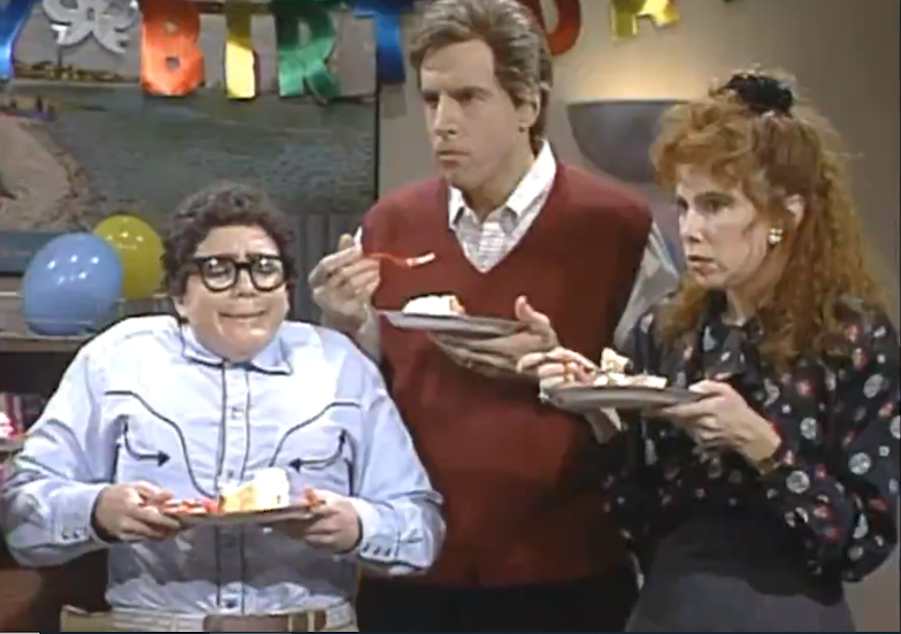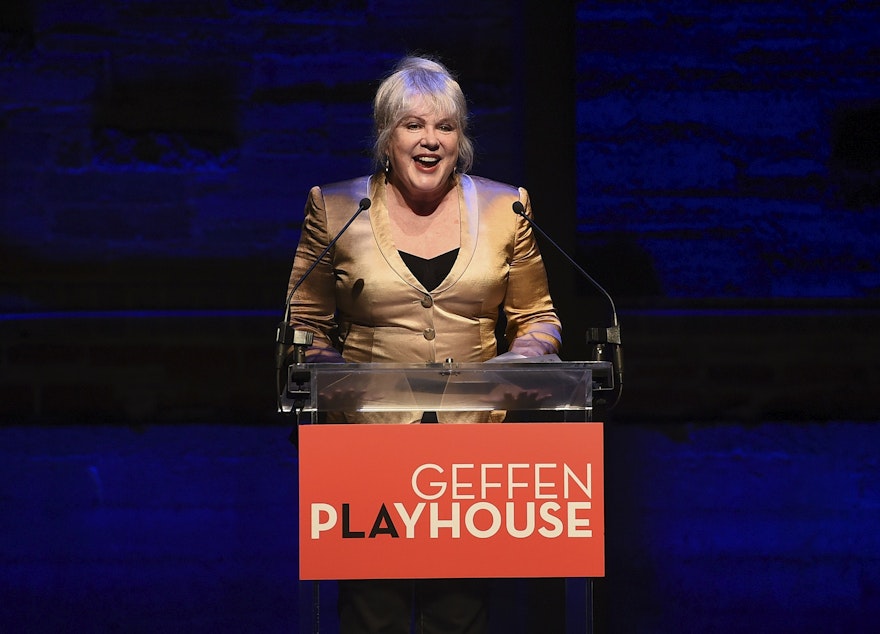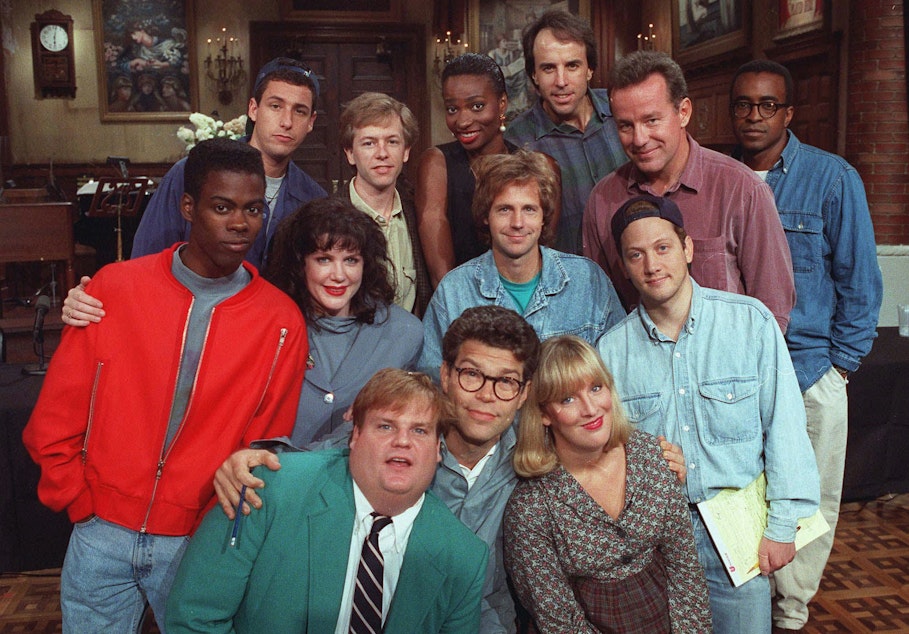Remember 'It's Pat?' The actress who played Pat doesn't know if she should apologize

Actress Julia Sweeney played Pat on Saturday Night Live in the 1990s. Pat was socially awkward and annoying — and androgynous.
Critics say Pat was a cartoonish and dehumanizing depiction of a minority group. Here’s Sweeney’s take on her character, as told to host Bill Radke.
“I don't think of Pat as offensive, even though I understand how people can think of it as offensive.
I came up with this character at The Groundlings Theater in L.A., and it was part of my audition for Saturday Night Live.
It was a very thin character and a very thin premise, not a developed character at all. In fact, I based it on a guy, and I didn't feel like I could pull it off in drag completely. And so I thought, ‘Oh, I'll throw in a joke where you can't tell if it's a man or a woman to cover for my lack of ability to come off as a guy.’
Julia Sweeney, "Older and Wider"
Bill Radke talks to comedian Julia Sweeney, about her SNL character Pat, and her comedy show at the Neptune Theater on February 1, 2020, "Older and Wider."
And then the audience laughed so hard at that … so the character at The Groundlings naturally became more about Pat's androgyny than it did about Pat's annoying character. But the original idea was about this annoying coworker who won't leave you alone and is drooling all the time.
Sponsored
The androgyny part was the LEAST interesting part of Pat.
To me, the joke is really on the people who can't stand that they don't know. But the character was inspired by this really annoying, drooly, gross person. That part really has nothing to do with androgyny. That just happened to be that way.
If I'd been smarter, I would have turned that character into a Charlie Chaplin, an enigma — taken all the personality away from Pat and let it be about everyone's reaction to Pat.

But I was so hell bent on being this annoying character, because that's fun to play. I pushed that too much and it got conflated with androgyny, which it shouldn't have. And then by the time we doing the movie, yeah, a lot of the jokes were how Pat was gross and weird and androgynous. So I wish I could do it over. But of course, I can't.
Sponsored
I don't think you could do Pat now because people would say, what are your pronouns? And then Pat would say whatever they were. I don't think Pat would say they/them though, because I think Pat is either male or female and heterosexual. We just don't know which one it is.
How do you know?
Because I'm the creator of the character!

I feel like everyone's walking on eggshells about everything and we're re-reviewing everything we've ever laughed at or done, which I think is actually fantastic. But I also think going into comedy worried about not offending any particular groups' feelings to a certain degree inhibits any kind of comedy.
Sponsored
I think you have to be okay with laughing at some types of personalities.
Should the creator of Poindexter offer a blanket apology to all skinny, tall, nerdy guys with glasses who were called Poindexter in high school?
But nerdy, skinny, tall guys are winners in society…
Where androgynous people are not necessarily.
I didn't know that much about the androgynous community. I definitely didn't think about androgynous people being upset by it.
Sponsored
I knew about people who looked androgynous, but they were affecting the look. In my mind, Pat was androgynous absentmindedly. If Pat knew that people thought Pat was androgynous looking, Pat would be offended by that and immediately say what Pat was.
If people felt bad about Pat — like Abby McEnany, who I'm working with now on Work in Progress — I am sorry about that.
I'm obviously still struggling with it. I don't want to automatically offer an apology without really feeling like I did something wrong. And I'm not sure I did something wrong. But I also acknowledge that there was a byproduct of what I did that made a certain group of people maybe feel bad.
I need to understand what the apology really is. Is it that I should have known then not to do a character like that?
I hate automatic apologies. For me to just offer an apology because it makes a situation like this feel better — I resist that. On the other hand, OF COURSE I'm upset that I created a character that made some people feel more victimized than they might otherwise have felt. I mean, that's terrible.
Sponsored
I think I was unenlightened in a lot of ways. I was naive in a lot of ways. But I also thought it was a funny character, and I had a lot of fun doing it. And I when I wrote the Pat jokes, I was concentrating on laughing at the people who were uncomfortable around Pat.
Christine Zander, who wrote all the sketches with me at Saturday Night Live — we made a pact at the very beginning that we weren't making fun of androgynous people. We were gonna make fun of Pat being weird. And we would have laughs off that.
I'm proud of that work. You don't often have a character hit the public consciousness and become part of pop culture. And I'm happy about that.
So it's hard for me to know whether I'm saying I apologize for it.
We should all be androgynous...
First of all, ohmygod I'm so for androgynous people. Our society is way too stratified. Girls try to be too girly.
I don't like women who wear a ton of makeup and put their breasts on display. And I struggle with that, even with (people in) the trans community who are doing that.
It reflects a patriarchy and the stratification of our society and all kinds of stuff about our society that I don't like.
I think this especially after the high fertility years. I live in Hollywood, and you see these beautiful blondes with the tiny waist, and they turn around, and they're 80 years old. Same for men, dyeing their hair and trying so hard to accentuate their masculinity way beyond the years they should be doing it.
Once you're over the hump, you're like Casper the Friendly Ghost, and you walk around, no one pays attention to you.
You are invisible. That has some negative things with it. But 95 percent is fantastic: I get to see the world as a movie, and I just get to watch it.
This interview was edited for length and clarity.
Julia Sweeney's show "Older and Wider" will be at the Neptune Theater in Seattle on February 1, 2020.

